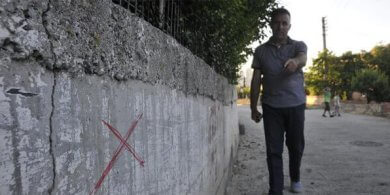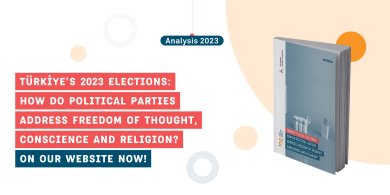
22.08.2012, Forum18.org / Mine Yıldırım
Turkey’s Constitutional Reconciliation Commission (AUK), in drafting a new Constitution, has been considering the provision protecting the right to freedom of religion or belief. However, the political parties represented on the AUK have not reached a consensus on this. The ruling Justice and Development Party (AKP) has presented its own proposal, rejecting proposals from the main opposition Republican People’s Party (CHP). If the AKP’s proposal is the basis for this part of the new Constitution, partial progress in protecting freedom of thought, conscience or religion will be seen. But perhaps not as much progress as if the CHP’s proposal had been accepted as the start. These protected the right to conscientious objection, and defined secularism as meaning that the state will observe equal distance towards all religions.
So will the new Constitution – when it is eventually adopted – advance the protection of freedom of religion or belief in Turkey? What would be the implications of the omission of some religious freedom commitments, affecting for example religious education, conscientious objection, and the role of the Diyanet?
Politicians and society had hoped that the AUK would make unanimous decisions in drafting the new Constitution. On issues where consensus has not been reached, the proposals of parties are included so that the texts will be considered by the – AKP-dominated – General Assembly of the Parliament. The final draft text ready to be passed to the General Assembly has however not been completed. It was hoped that Turkey would have a new Constitution by the end of 2012 but this now seems unlikely.
The AUK is chaired by Grand National Assembly Speaker Cemil Cicek, and its members are drawn from the AKP, the opposition CHP (through which the Republic’s founder, Mustafa Kemal Atatürk, led Turkey as a one-party state), the Nationalist Movement Party (MHP), and the Peace and Democracy Party (BDP).
The AUK has received submissions on religious freedom from various religious and civil society groups. However, some such as the Baha’is, Jehovah’s Witnesses, atheist and agnostic groups did not become involved in this process (see F18News 13 June 2012http://www.forum18.org/Archive.php?article_id=1711).
The AKP proposal
The AKP government has proposed the following text:
“(1) Everyone has freedom of religion, conscience and belief. This right includes the right to live and to manifest one’s religion or belief, alone or together, in public or private, through worship, education, teaching, practice and performing ceremonies, and has the freedom to change one’s religion or belief.
(2) No one may be compelled to participate in worship, religious practice and religious ceremonies, to disclose one’s religious beliefs and thoughts, and may not be prevented from performing these [worship, religious practice and religious ceremonies]. No one may be condemned, accused or subjected to different treatment based on their belief, thoughts, opinion and performing or not performing the requirements of these [worship, religious practice and religious ceremonies].
(3) In carrying out its tasks in the field of education and teaching, the state will comply with the parents’ right to desire that the education and teaching be carried out in line with their religious and philosophical beliefs. Religious Culture and Knowledge of Ethics lessons will be among the compulsory lessons taught in primary and middle educational institutions. Religious education and teaching is subject to the consent of individuals, and in the case of minors, their legal representatives.”
Also, Turkish media reported on 10 August that the AKP is proposing a phrase stating that “the right to freedom of religion includes the right to associate”. The CHP’s reaction to this is not known. The proposal was reportedly accepted by the BDP, while the MHP opposed its inclusion.
– Broadening of protection
The first paragraph broadens the protection of freedom of religion or belief, as Article 24 of the current Constitution only explicitly protects the right to worship (see F18News 30 November 2011http://www.forum18.org/Archive.php?article_id=1641). Yet it is unclear what the AKP means by adding the phrase “to live”, which is not found in international human rights provisions.
Protecting manifestations of religion or belief and practice provides a basis for protecting the wearing of religious symbols or clothing, religious practices such as praying the namaz (Islamic prayer rituals) five times daily, or fasting. This may open the way for wearing religious clothing such as headscarves in public institutions, such as universities, where this right is restricted for employees (see Forum 18’s Turkey religious freedom survey athttp://www.forum18.org/Archive.php?article_id=1379).
– The right to change belief
The explicit reference to the right to change religion or belief is in line with Article 9 (“Freedom of thought, conscience and religion”) of the European Convention on Human Rights and Fundamental Freedoms (ECHR), which Turkey ratified in 1954. Article 24 of the current Constitution does not explicitly protect this right (see F18News 30 November 2011 http://www.forum18.org/Archive.php?article_id=1641).
Fortunately, the AKP and the other parties did not hesitate to provide this explicit protection. This may also be seen as important as it sets an example for Middle Eastern countries where the right to change one’s religion or belief is not recognised.
– The need for a limitations clause
The second paragraph does not include any conditions under which the right to manifest religion or belief can be restricted. It would be good if the new Constitution were to include the restriction clause used in Article 9 of the ECHR (see F18News 7 February 2011http://www.forum18.org/Archive.php?article_id=1537). This states:
“Freedom to manifest one’s religion or beliefs shall be subject only to such limitations as are prescribed by law and are necessary in a democratic society in the interests of public safety, for the protection of public order, health or morals, or the protection of the rights and freedoms of others.”
Adopting a specific restriction clause for religious freedom would be better than adopting a general constitutional restriction clause on all fundamental rights. This would lay down the specific conditions, in line with international human rights law, under which the right to manifest religion or belief may be restricted. This would also reduce the risk of unspecific laws or regulations being introduced that could be used arbitrarily.
– Education
The third paragraph in the AKP’s proposed text on teaching religion or belief is crucial, as it reflects the basis of policies in the field of education (see F18News 13 June 2012http://www.forum18.org/Archive.php?article_id=1711). The inclusion of respect for parents’ right to educate their children in line with their own religious or philosophical views is consistent with Turkey’s international human rights obligations.
But the continuation of the compulsory Religious Culture and Knowledge of Ethics (RCKE) lessons is incompatible with international human rights obligations. The European Court of Human Rights (ECtHR) in Strasbourg in its Zengin v. Turkey judgment, as well as Turkey’s Court of Cassation, have held that RCKE lessons are incompatible with the country’s human rights obligations (see F18News 23 August 2011http://www.forum18.org/Archive.php?article_id=1603). Despite changes in the curricula of the lessons, the Reform in Education Initiative found that significant problems remain (see F18News 13 June 2012 http://www.forum18.org/Archive.php?article_id=1711).
Calls have continued from some parts of the Alevi community as well as civil society organisations for compulsory RCKE lessons to be abolished. But as with conscientious objection to compulsory military service, the government’s political will – not court judgments or the experience of victims of human rights violations – is the deciding factor in this part of the AKP’s constitutional proposal (see F18News 1 May 2012http://www.forum18.org/Archive.php?article_id=1696).
More.
______________________________________________________________________________________________

